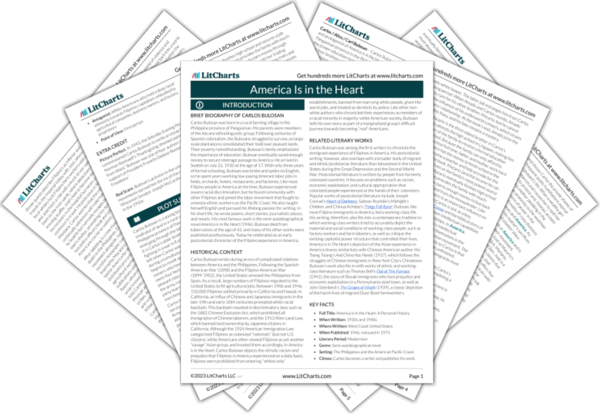In America is in the Heart, America symbolizes hope and the promise of advancement out of the dire circumstance into which Carlos Bulosan, the author and protagonist, is born. Coming to America allows Carlos to gradually transform from an illiterate peasant to a published writer. At a young age, Bulosan recognizes that being a Filipino peasant entails a cycle of poverty and ignorance. He understands that his poor, illiterate parents cannot improve their situation, and wants to avoid their fate. Early in the novel, Carlos observes how America inspires the peasantry to revolt against the landed elites following the close of the Spanish-American War. America also brings public education to the Philippines, and Carlos’s parents and brothers tell him that education is a necessary tool for advancing out of poverty. Among the most crucial moments in book occurs when Dalmacio teaches Carlos about Abraham Lincoln, a poor boy who became President of the United States. For Carlos, Lincoln’s extraordinary story is emblematic of the kind of social advancement that America offers, but which is impossible to achieve in the Philippines. Even when Carlos immigrates to America and experiences brutal racism and economic exploitation, he does not lose hope in American ideals. Despite having no formal education, America introduces him to new people and new ideas that enrich his life. Americans like Alice and Eileen Odell provide him with books to learn from, while his circle of friends and associates in the labor movement help him understand how to put the American ideal of equality into practice. By the end of the novel, Carlos takes to heart Macario’s lesson that America is an “unfinished dream” fueled by the “hopes and aspirations” of immigrants like himself who must work daily to finish that dream.
America Quotes in America Is in the Heart
Why don't they ship those monkeys back where they came from?
And perhaps it was this narrowing of our life into an island, into a filthy segment of American society, that had driven Filipinos like Doro inward, hating everyone and despising all positive urgencies toward freedom.
Why was America so kind and yet so cruel? Was there no way to simplifying things in this continent so that suffering would be minimized?
I knew, even then, that it was not natural for a man to hate himself, or to be afraid of himself. It was not natural, indeed, to run from goodness and beauty, which I had done so many times.
America is not merely a land or an institution. America is in the hearts of men that died for freedom; it is also in the eyes of men that are building a new world.
I knew now. This violence had a broad social meaning; the one I had known earlier was a blind rebellion. It was perpetuated by men who had no place in the scheme of life.
I was enchanted by this dream, and the hospital, dismal as it was, became a world of hope. I discovered the other democratic writers and poets, who in their diverse ways contributed toward the enlargement of the American dream.
I acquired a mask of pretense that became a weapon I was to take out with me into the violent world again, a mask of pretense at ignorance and illiteracy, because I felt that if they knew that I had intellectual depth they would reject my presence.
Maybe I succeeded in erasing the sores, but the scars remained to remind me, in moments of spiritual vicissitudes, of the tragic days of those years.
But now this desire to possess, after long years of flight and disease and want, had become an encompassing desire to belong to the land—perhaps to the whole world.
They worked as one group to deprive Filipinos of the right to live as free men in a country founded upon this very principle.
Then it came to me how absolutely necessary it was to acquaint the Filipinos with the state of the nation.
We are Americans all who have toiled for this land, who have made it rich and free. But we must not demand from America, because she is still our unfinished dream.
It came to me that no man—no one at all—could destroy my faith in America again.












